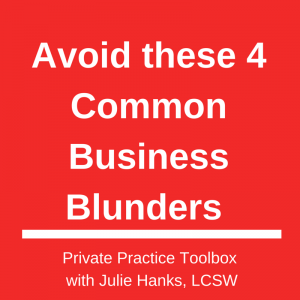 "Learn from the mistakes of others. You can't live long enough to make them all yourself."
"Learn from the mistakes of others. You can't live long enough to make them all yourself."
-Eleanor Roosevelt
When starting out in private practice, there's a lot to know. A lot. The learning curve can be painfully steep, particularly in ways for which we received no official training (finances, hiring practices, etc.). And no matter how knowledgeable or skilled a clinician is, he/she will inevitably take a few wrong steps. And that's okay!
We recently opened up a discussion on our Facebook page to get feedback about common business mistakes that therapists made when they were getting started in private practice. The responses were overwhelming; it seems many of you were eager to reflect on and share lessons that you learned the hard way! Though there were many answers given, a select few kept coming up that are worth addressing. Here are 4 common business mistakes to avoid when starting private practice:
 1) Taking Clients Who Are Not Ideal
1) Taking Clients Who Are Not Ideal
Building a clientele from scratch can be daunting, and if you're desperate for business, it might be tempting to take just anyone. But agreeing to see someone who is not your ideal client can be a miserable experience for both you as a therapist and the individual who is paying for professional services. Instead, politely refer to a therapist who is a better fit, continue to market yourself using the REST strategy, and wait for the right clients to come along.
2) Not Hiring a Good Accountant
Many in our group regretted that they hadn't taken on a CPA sooner to handle the finances, bookkeeping, and taxes (especially quarterly ones!). As so many in our Private Practice Toolbox group can attest, it's a worthy investment. One woman explained how she had initially set up her LLC incorrectly and later had to pay thousands of dollars to fix her mistake and get her business running smoothly again. Moral of the story: hiring a skilled accountant may be a bit expensive, but it's absolutely worth it!
3) Insufficient Infrastructure for Unexpected Growth
For those new to the game, having an influx of clients might sound like a good thing, but the reality is quite different. Having too many clients can cause burnout, being short-staffed, and getting behind on administrative tasks. Don't be afraid to refer potential clients to trusted and reputable colleagues. Making sure your practice is secure and stable will make it so that you can handle the growth over time.
4) Not Understanding Insurance Companies
Insurance panels are notorious for being confusing and complicated. Enlist a seasoned friend or mentor in your local area to help you navigate the process. Don't wait until you encounter a business emergency or financial crisis to understand all the ins and outs of insurance companies (such as understanding how client health benefits are different from behavioral health benefits). Become as versed and experienced in how to work with them as you possibly can so that you can avoid problems and get properly paid on time.
(I do hope that your goal is to eventually get off of insurance panels altogether and instead adopt a fee-for-service model. Click here to access my webinar about how to do so.)
What mistakes have YOU made that you would advise others against?
What did you learn from them?
Get practice tips and blog updates in your inbox. Sign up for the Private Practice Toolbox Newsletter here.
Learn about my private practice consulting
Join my Private Practice Toolbox Facebook group and connect with 3000 therapists around the globe in 2 simple steps: 1) Click request to join the group and 2) Fill out this brief questionnaire before you'll be added to the group.


 If you're considering going into private practice, it's always smart to talk to other clinicians who have been there. When I opened my practice years ago, I had very little business experience. Luckily, I did a few things right that allowed me to be profitable (and it didn't hurt to be married to a CPA). Over time, I learned that I have a knack for marketing and networking that has allowed
If you're considering going into private practice, it's always smart to talk to other clinicians who have been there. When I opened my practice years ago, I had very little business experience. Luckily, I did a few things right that allowed me to be profitable (and it didn't hurt to be married to a CPA). Over time, I learned that I have a knack for marketing and networking that has allowed
As healers, we genuinely like to do our work. Guiding clients through the therapy process and seeing them make progress is why we do what we do. But if you're in private practice, you know there's a lot going on in the back end and that it's crucial to run an efficient and organized business.